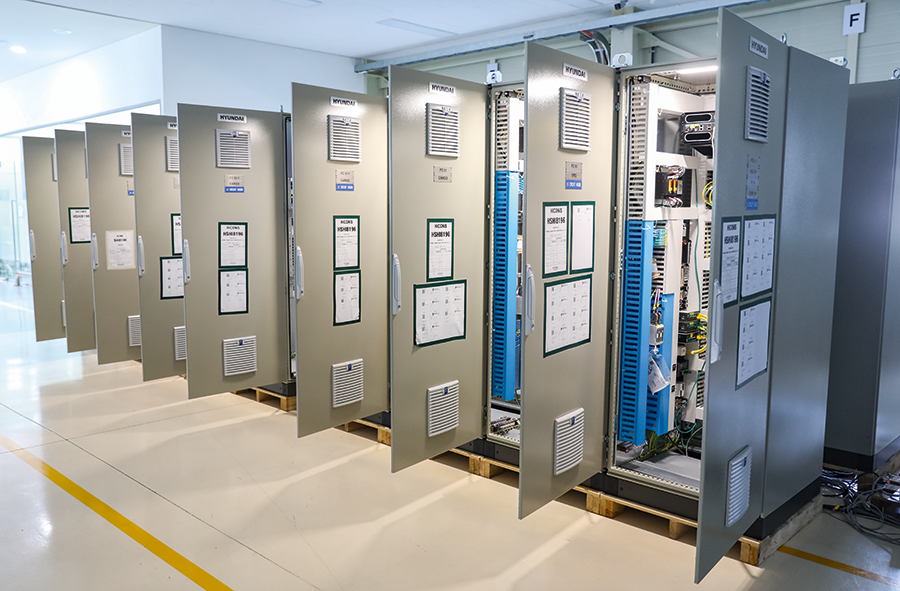Text Jannick Bangard ––– Photography
Everything on board, apart from pressure – when punctuality, quality and reliability come as standard.
The South Korean port city of Ulsan is home to one of the largest shipyards in the world. Around 25,000 workers build as many as 100 giant freight ships here every year. In the belly of each of these ships is a huge amount of electronic and automation technology that will later be used to control the key functions of these massive floating beasts. This is where HD Hyundai Global Service (HGS) comes in. The company has made a name for itself in the shipping industry as a “total solution provider”, supplying maintenance, repairs and technical support, for example, throughout the entire life cycle of a freighter. Falling under the responsibility of the Digital Solution division, another core competence of HGS is providing smartship and digital control solutions that are needed for optimising routes, monitoring and analysing large machinery, including the primary and generator engines, freight management, and the loading and unloading of liquid gas tankers, for instance. However, global supply bottlenecks and rising cost pressure are creating strong headwinds, and the shipping industry is a tough business. Plant engineers such as HD Hyundai Global Service have to meet the most stringent requirements of their customers and rely on suppliers who account for these requirements in their products and solutions. The aim is to achieve the highest levels of reliability, quality and flexibility, so as to provide a solid basis for the rest of the value creation process. That is why HGS uses standardised enclosure systems from Rittal when it comes to installing the technical infrastructure.
PUNCTUALITY AND QUALITY
The benefits are already being seen in Ulsan. Ships are built there using the block assembly method, and there is a strict timetable for installing all the components in each block. It is almost impossible to install equipment retrospectively, so HGS depends on enclosures and other items being delivered absolutely on time. In the belly of the ship, Rittal enclosures also offer the dependable quality that is required. “We value the solutions from Rittal because we can rely on their high quality standards in our projects. For example, there can be strong vibrations in the engine room, meaning our infrastructure is subjected to high stresses. We need absolute dependability, and that’s what we get from Rittal,” says Kim Suhyun from the Quality Control Team at HGS.
In addition, technical flexibility is a top priority when it comes to the interior fit-out of the enclosures. After all, the packing densities in enclosures on ships are particularly high due to the lack of space. On top of this, ever more complex applications for control and automation technology and power electronics also require maximum extendibility. Rittal makes this possible with its enclosure system and comprehensive range of accessories, which together offer a wide variety of expansion options.
A SINGLE INSTALLATION PLATFORM FOR EVERY SITUATION
To achieve a higher level of efficiency in the value creation process, HD Hyundai Global Service has opted for standardised plant engineering. “We can use standardised solutions from Rittal as a common installation platform for a whole host of control systems, for example,” says Kim. “They can be used to create customer-specific solutions that are tailored to the requirements of individual products. Without these solutions, it would be very difficult for us to configure a variety of customer requirements.” This makes it clear what a deciding factor standardisation has become, as it not only cuts costs for the customer, but also makes it possible to optimise engineering, production and supply logistics. For HGS, the advantage is that the Rittal enclosure system is already certified for maritime applications by DNV, Lloyd's Register and Bureau Veritas. As a result, there is no need for the plant engineer to undertake complicated and time-consuming certification processes. “In a globalised world that is becoming increasingly unstable, the standardised processes and products from Rittal therefore provide stability, reliability, and ultimately a decisive competitive edge,” says Hendrik Lehmann, Solutions Sales Manager Maritime & Aviation at Rittal.


